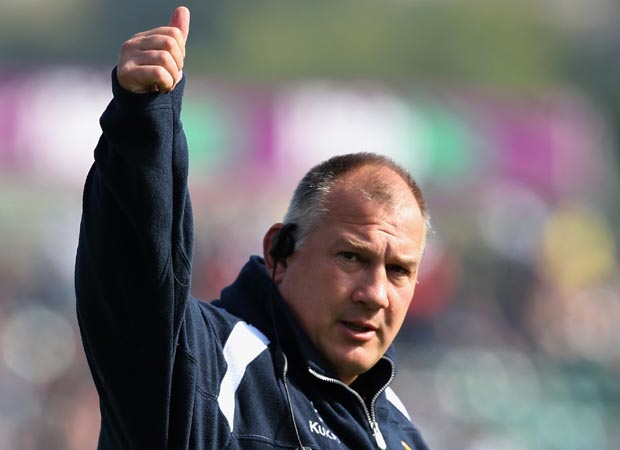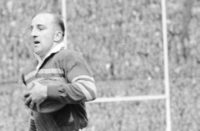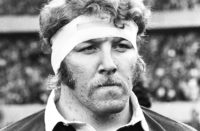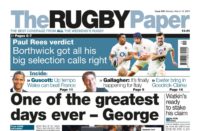 As the birthplace of Aneurin Bevan and cradle of the National Health Service, Tredegar has a history of global renown. The townsfolk at the top of the Sirhowy Valley used to be so far ahead of the game that they pioneered the iron ore business long before the Industrial Revolution. Now they are so far behind the game they cannot raise a rugby team.
As the birthplace of Aneurin Bevan and cradle of the National Health Service, Tredegar has a history of global renown. The townsfolk at the top of the Sirhowy Valley used to be so far ahead of the game that they pioneered the iron ore business long before the Industrial Revolution. Now they are so far behind the game they cannot raise a rugby team.
Their plight provides an even more alarming example of the rotting state of Welsh rugby at grass-roots level than the case of Deri, the village team highlighted in this column last week over the suspension of all first-team fixtures.
Tredegar, four divisions higher up the Welsh pyramid than Deri, should have been at home in Division Two East last Saturday to Rhiwbina, the Cardiff club where Sam Warburton learnt how to play the game with other local lads in the neighbourhood on the northern outskirts of the capital.
The Welsh Rugby Union website referred to the non-event as ‘Match Postponed', a catch-all description which conveniently camouflaged the real reason. Now sometimes news is not necessarily when it happens but when it breaks, and the real reason why the fixture did not take place can now be revealed.
No sooner had runaway leaders Rhiwbina driven up from Cardiff than they realised they had nobody to play. According to Rhiwbina, Tredegar had four players. The embarrassed hosts claimed they had five.
In one respect, it is a more damning indictment of Welsh rugby's decay than Deri's inability to put out a first-team since last October. Tredegar has some rugby history to go with the father of the Welfare State, the old ironworks and the town's Premier League brass band.
Pre-professionalism, Tredegar had a place among the Welsh club elite as one of the 16 ‘Merit Table' clubs who competed for a mythical title. Nobody dared refer to it as a League, a dirty word back then far too synonymous with the beastly business of the 13-a-side code in the north of England.
There was a time when the Christmas derby against Ebbw Vale, less than three miles away, would pull in crowds which one old-timer estimated the other day at ‘around 4,000'.
There was a time, too, when Tredegar had seriously good players, old-school, hard-as-nails forwards like John Dixon, Mel Bevan, Sid Wharton and, more recently, the one-man back row, Frank Jacas.
They also provided players of international repute – Mark ‘Scooby Doo' Jones, a back row forward who went on to become a dual cross-code international; Mike Ruddock, the former Wales Grand Slam coach, and the late Paul Woods, a firebrand of a scrum-half who went north and took the Rugby League hard men on at their own game.
Tredegar's predicament is all the more serious than Deri's because they used to be somebody on the club scene. Those charged with the unenviable task of trying to stop the rot appreciate the gravity of the position.
“We've hit rock bottom to be perfectly honest with you,” Sharon Hamer, the club's new secretary, said. “Whether we will have a senior team next season, I don't know.
“The players all agreed they would turn up for last week's home match. In the end, only five of them did. This is the second time we've been unable to fulfill a fixture because we didn't have enough players.
“We want answers to our questions and we're slowly getting to the bottom of it.
“Some of the players are paid and some get a beer allowance. I've only just recently taken over. It's a hard job and a thankless one. The club is not in a good position at the moment. We have asked for some advice from the WRU. They haven't been very forthcoming.”
In their largely self-congratulatory letter circulated last week to all 320 member clubs, the WRU failed to make any mention of the increasing number of clubs unable to fulfill their fixtures or in danger of doing so.
“It is no exaggeration,” the Union wrote, “to state that the Welsh Rugby Union is one of the most successful in the world game and the foundation of that strength is the unity of purpose we share.”
Those words will sound hollow as Tredegar sift through the mess of a once proud club. No sooner had the Union cited an investment of more than £27m into the community game than on Wednesday they announced additional funding.
Increases of £1.5m a year for the Welsh Premiership and £2.6m for the community game beg the question why the money was not made available sooner. It may, of course, have been pure coincidence that the move followed David Moffett's expose of the Union's financial affairs, claiming they were sitting on reserves of £11m.
The WRU denounced their ex-chief executive's claim as ‘scurrilous'. Not surprisingly, Moffett, on a crusade to become the WRU's next chairman, made political capital out of his former employers' decision to cough up more funds.
“I have had to come halfway round the world to unlock additional funding for the Premiership and community game in Wales,” Moffett said. “However, as with a lot of things coming from the WRU their announcement requires further scrutiny.
“It seems that the WRU ‘forgot' to announce that the extra money for the Premiership had to be released as a direct result of their earlier decision to increase the number of teams by two to 12 from next season.”


























